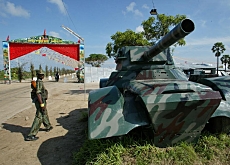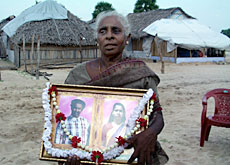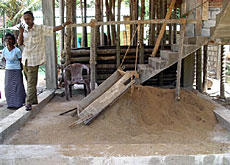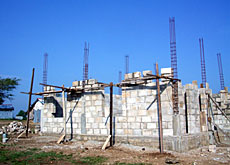Ethnic tensions threaten tsunami aid

Tsunami aid workers in Tamil-controlled northern Sri Lanka have to contend with the tense ethnic situation on a daily basis.
The Liberation Tigers of Tamil Eelam (LTTE) have been fighting for an independent homeland in the north and the east of the country for more than 20 years.
There are two checkpoints to pass when entering the mainly Tamil-controlled north of the country from Sinhalese government lands.
At the first, the Sri Lankan army searches bags for weapons – standard procedure.
It is then a short journey though no man’s land to the highly organised Tamil crossing. Pictures of the elusive Tamil leader, Velupillai Prabhakaran, are everywhere.
When swissinfo visited the Vanni area in the north it was just after Prabhakaran’s annual speech at the end of November to mark the rebels’ war dead. Flags in the Tamil colours of yellow and red, as well as military insignia, adorned the roadsides and intermingled with the placards warning of mines in the surrounding fields.
Toll
In all, 64,000 died in the conflict before an uneasy ceasefire between the two sides in 2002. The situation has taken its toll on the local economy and people.
Karin Voigt, the head of mission for Sri Lanka for Swiss non-governmental organisation, Swiss Labour Assistance, said that the main problem in the Vanni area was a general lack of development owing to 20 years of war.
Private and public infrastructure had been destroyed, and areas had to be demined to allow internally displaced persons (IDPs) to return, she told swissinfo.
She explained that, economically, returnees had limited confidence in investing in their future. There was also a “brain drain” with many people looking for career opportunities elsewhere.
Last year’s tsunami hit the already-depressed region hard – with the north accounting for half of the at least 30,000 deaths in Sri Lanka.
Assistance
Swiss Labour Assistance, which has joined forces with two international NGO partners to form the Solidar aid consortium, has been offering assistance to victims along 100 kilometres of affected coastline in the districts of Mullaitivu and Kilinochchi.
The consortium has built four transit camps, which provide 260 shelters as well as sanitation, schools and community halls.
Boats and equipment have been donated to fishermen, many of whom lost everything in the wave. Kitchen gardens have been set up to provide extra nutrition.
Work has now begun on building 1,125 permanent houses in six villages. The planning has been carried out in close consultation with the beneficiaries.
Voigt says that the special situation – it’s a Tamil-controlled area but still within the government’s jurisdiction – has complicated aid work.
“Each side needs to be informed about each step. We have double information and double administration so it takes time.”
It also takes time to plan a whole village, explained Voigt, outlining that 29 steps needed to be completed. Mines also had to be cleared. Meanwhile there is pressure from all sides for rebuilding to be done quickly.
Rising tensions
Both the government and the Tamil Tigers say they want peace and are ready for talks, but tensions have been rising.
In his November speech, Prabhakaran said the Tigers would intensify their struggle if there was no settlement within the next year.
Sri Lanka’s new president, the Sinhalese Mahinda Rajapakse, was elected earlier that month on a pledge to be tough with the rebels. This election was largely boycotted by the Tamils.
Rajapakse has since invited the Tamil Tigers to resume peace talks, but escalating violence in the north and east has led to fears that the conflict could break out again.
In the government-held Jaffna peninsula at the very top of the island, above the Tamil area, 14 soldiers died earlier this month in mine attacks – one of which damaged a vehicle in which three Swiss Development and Cooperation agency (SDC) aid workers were travelling. No one was hurt.
It has been reported that some aid workers have already pulled out of the region or been banned from travelling. But the Swiss Embassy told swissinfo in December that it was continuing its operations in the area.
Continuation
Ruth Dällenbach, the head of Swiss Labour Assistance, said the “complex political context” implied risks for the organisation’s projects in the Vanni region, but that no withdrawal was yet in sight.
“The organisation will continue its work in Sri Lanka during the more tense situation. People form the heart of its intervention, who as tsunami victims or as IDPs need support,” Dällenbach told swissinfo.
She stressed that staff security was a top priority and that the NGO was continuing to monitor the situation. In any case, withdrawing could add to the tensions, said Dällenbach.
Voigt confirmed from Vanni that while staff travel to Jaffna and the east had been limited, the aid programme was set to continue.
“So far the increased tensions… do not affect our work. The attacks are very targeted and there are no incidences in Vanni itself, where the situation is as usual calm,” she told swissinfo.
“Project work continues at a normal pace.”
swissinfo, Isobel Leybold-Johnson in northern Sri Lanka
Swiss Labour Assistance joined forces with Norwegian People’s Aid and Arbeiter Samariter Bund to form the Solidar consortium in Sri Lanka after the December 26, 2004 tsunami.
The consortium is implementing a joint rehabilitation programme to assist with post-tsunami development work in the country.
In all, the Solidar network consists of 29 European NGOs and is active in 90 countries.
Swiss Labour Assistance is helping to rebuild the region, including houses, kindergartens and community halls.
It expects to be working in the area for at least another 2-3 years.
The affected community is involved in all aspects of the rebuilding programme and the NGO is aiming for sustainable development.

In compliance with the JTI standards
More: SWI swissinfo.ch certified by the Journalism Trust Initiative




You can find an overview of ongoing debates with our journalists here. Please join us!
If you want to start a conversation about a topic raised in this article or want to report factual errors, email us at english@swissinfo.ch.